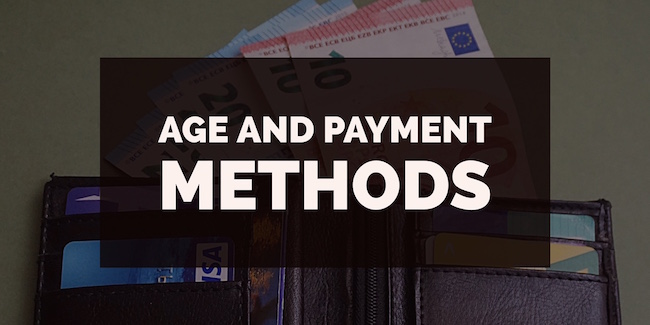As someone involved with an innovative payment company, it’s my job to have my finger on the pulse on the exciting new developments going on with the payment industry. There are moments though when I take that for granted.
I recently caught-up with my family for my grandmother’s birthday. When my parents, aunts, uncles, and grandparents ask me how’s work going they tilt their heads slightly and deliver the most confused expressions ever as I describe cryptocurrencies.
At first, I thought that maybe this was because they weren’t in the industry. But, it became evident that it was because there was a generational gap between the preferred payment methods between me and my older family members.
To test this theory, I started digging around and did in-fact discover that age plays a part in how we chose to transfer funds from one party to another.
Table of Contents
ToggleSeniors
Although seniors, those aged 66 or older, do use a variety of payment methods, checks are used by this age group more than any other. And, that shouldn’t be all that surprising.
For starters, seniors have written checks their entire lives, so it’s a payment method that they’re comfortable and familiar with. However, this generation is also less likely to go online or own a smartphone. In fact, the Pew Research Center states that “four-in-ten adults ages 65 and older (41%) do not use the internet, compared with only 1% of 18- to 29-year-olds.”
Additionally, only 30% of the so-called “silent generation” owns a smartphone and only make-up 5% of mobile payment users. Don’t expect to embrace peer-to-peer payments apps, online banking, or cryptocurrencies like bitcoin.
However, 32% of seniors do prefer debit cards, while 38% have selected credit cards. What’s most interesting is that when it comes to plastic this group enjoys American Express with 28% owning an Amex card.
Baby Boomers
If you’re between the ages 45-65 you probably still paper-based payment methods. But, this group is also open to electronic payments, specifically Automated Clearing House (ACH) debits and bank online bill pay. However, 43% of those between 45-54 actually prefer to use debit cards.
With 56% of boomers also owning a smartphone, they’re using payment apps. In fact, 17% have used P2P, with 20% of users having used P2P within the past week.
Generation X
This age group, which consists of people between the ages of 31-44, grew-up in a world filled with checks and plastic. In fact, 49% of 25-34 year-olds prefer to use their debit cards. On the other hand, they’re also young enough to embrace and understand new payment technologies.
Not only do 83% of this group own a smartphone, 25% have used P2P, 27% of within the past week. And, 35% would opt to be with their mobile device instead of their wallet.
Millennials
Millennials, those roughly between 18-30, are now the largest age demographic. And, they’re also the most comfortable with e-payment alternatives since they grew-up with the internet at their fingertips. I would even venture to say that they can’t leave without technology. Only 1% of Millennials aren’t online and a whooping 90% have a smartphone that they use to make purchases, pay bills, earn rewards, and receive notifications to avoid late fees, view receipts, and control their spending.
32% of Millennials use P2P, 46% within the last week. And, 42% would prefer to pay with their mobile phone.
But, that doesn’t mean that Millennials have completely given-up on cash.
According to the 2015 Accenture Payment Services survey, 58% of Millennials still prefer to get paid with cold, hard cash. 26% chose apps, with checks and electronic bank transfers tied at 8%.
When it comes to apps, PayPal is the most popular, which was followed by Venmo, Google Wallet, and Square Cash.
A more recent survey found that the leading mobile payment apps are Android Pay (19%), Retailer mobile app (12%), Apple Pay (11%), Samsung Pay (3%), MasterPass (2%), CurrentC (1%), and Windows Phone Wallet (1%).
The Bottom Line
Your age most definitely affects your preferred payment methods. While there are several factors, it’s mainly based on what you’re familiar with. For older individuals who aren’t as tapped into technology, they’re accustomed to traditional methods like paper checks. For Millennials, who have grown-up using technology, they prefer newer methods like P2P apps.
At the same time, no one can dispute that cash remains king remain all age groups – at least for the time being.














